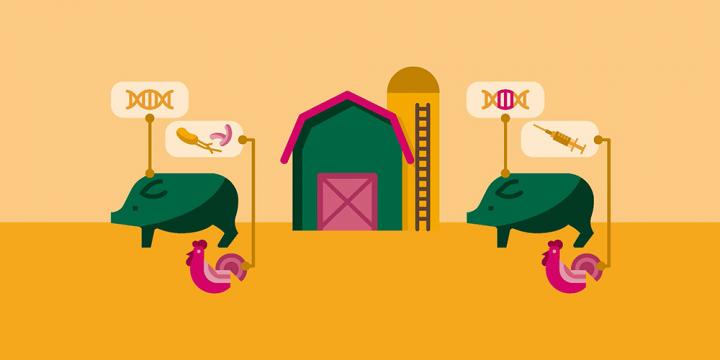Novel strategies to combat livestock diseases
Understanding disease resistance, infection, innate and vaccine-based immunity.

The rise of antimicrobial resistance among animals, people and the environment is recognised as one of the greatest threats to global healthcare.
Roslin scientists are playing a part in meeting the challenge by learning how to breed animals that are better equipped to resist disease, understanding what happens when infection occurs, and investigating innate and vaccine-based immunity.
Researchers are investigating the genetic basis of traits linked to livestock production, such as how well animals can convert their feed into weight. This insight can help reduce reliance on the use of routine antibiotics administered as growth promoters, still in use in many areas of the world.
Research towards development of phage therapy – using naturally occurring viruses to target bacterial infection – has shown that bespoke combinations of phages could be generated to treat specific infections.
Gene editing to control disease
Roslin’s efforts towards understanding the genetic basis of important animal diseases is demonstrated by the development of pigs that are gene-edited to resist Porcine Reproductive and Respiratory Syndrome Virus.
This devastating livestock disease can lead to secondary bacterial infections and significant antibiotic use.
Researchers removed a small section of a protein that the virus uses to infect the animals’ cells. While this leaves the rest of the molecule intact and functional, it blocks virus infection. This research was conducted in collaboration with the animal genetics company Genus.
Scientists are now exploring editing strategies for other pig viral diseases, such as African Swine Fever and flu.
Managing infection
Identification of genes linked to bovine tuberculosis (TB) has informed a national database of British cattle stock, as an aid to breeding selection.
Work is ongoing to understand genes that respond to ticks and infections in African cattle, in an effort to devise ways to better manage disease.
Resistance in aquaculture
In research relating to fish and seafood, scientists have investigated genes linked to resistance to amoebic gill disease and sea lice in salmon, Koi herpes virus in common carp, viral nervous necrosis in sea bass and viral and parasitic diseases in oysters.
Aquatic research is enabled by the construction of a £700,000 aquaculture facility at Roslin, supported by BBSRC and Agri-EPI. It also benefits from funding from Innovate UK and Landcatch, and in strategic partnership agreements with Hendrix Genetics and Worldfish.
Disease susceptibility
Research into the vulnerability of deer to prion diseases found that the majority of wild and farmed deer across Great Britain are likely to be susceptible to chronic wasting disease.
Gene-edited chickens expressing fluorescent protein – evidenced by glowing tissue in fluorescent light – were developed to study immunity in poultry. Researchers have used such birds to visualise the avian immune system at work and to study critical events during E. coli and Salmonella infections in poultry.
Improved vaccines
Insight into bird flu could aid work towards poultry vaccines and improve the production of vaccines for human flu.
Researchers are seeking to understand the biological pathways behind vaccination, including in relation to infectious bronchitis, bovine TB and Johne’s disease – a chronic disease of the intestinal tract.
Scientists have also supported the evaluation of novel vaccines for diseases including swine flu and porcine epidemic diarrhoea and have partnered with Roslin Technologies to develop an E. coli O157 vaccine for cattle, with the aim of limiting spread of this dangerous infection from cattle to humans.
Researchers are working towards improved adjuvants – substances that boost the effectiveness of vaccines – and have partnered with industry to develop these with respect to bovine TB, avian flu and Eimeria in chickens.
Ongoing research at Roslin includes focusing on the exchange of antimicrobial resistance genes between humans and animals. This could inform development of effective control measures, and aid efforts to limit antibiotic use in human and animal care.
Scientists are seeking to better understand the impact of antibiotic use in farming as pre-emptive measures against infection and to promote livestock growth.
Researchers are also working towards rapid diagnostic tests for diseases in livestock, such as pigs, which could help avoid unnecessary antibiotic use.
Related links
Genetic clues to TB-resistant cattle
Gene-edited pigs are resistant to billion dollar virus
Scientific breakthrough could explain how superbugs rapidly evolve
Superbug discovery renews hope for antibiotic treatment
Gene study pinpoints superbug link between people and animals
Roslin Technologies to develop E. coli 0157 vaccine
Graphics by Elena Bernabeu at Colored In Science


